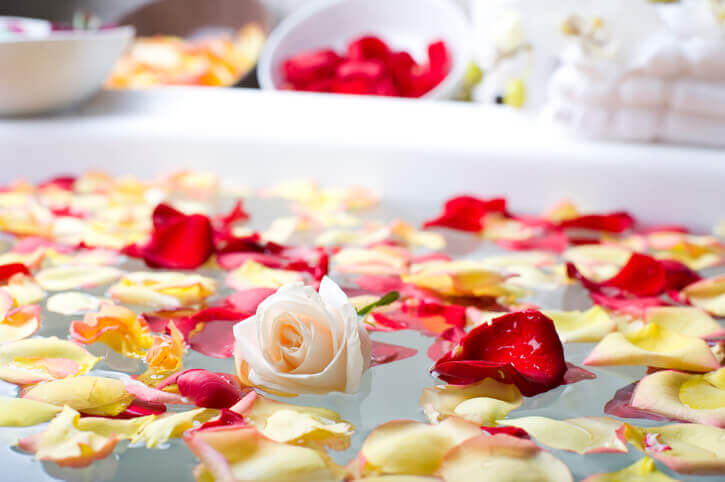Palmarosa comes from a tropical grass that is closely related to lemongrass and citronella and shares some of their uplifting qualities. Originally from India, there are two varieties: sofia and motia, of which sofia gives a finer aroma. To test the quality of palmarosa, tap the bottle on the palm of your hand, if the rising bubbles quickly disappear, the oil is of a good quality.
The many qualities of palmarosa
Palmarosa strengthening actions on the nervous system make it a useful oil for relieving nervous tension, stress and anxiety. Its use is believed to clarify the mind, enhance self-image and promote positive thought. It is a tonic for the digestion and circulation. However, palmarosa is most valued for its skincare properties. As an ingredient of soaps and a cosmetic perfume, it hydrates skin and stimulates skin growth.
Active Ingredients of Palmarosa
High levels of alcohols and other compounds contribute to palmarosa's uplifting effects.
Esters
These may make up to 10% of the oil. Esters such as geranyl acetate prevent scarring and fight infections.
Alcohols
High concentrations of alcohols give palmarosa its uplifting and refreshing properties. The main alcohol, geranol, gives it a powerful aroma and antiseptic action. It is also an ingredient of the closely related lemongrass and citronella oils.
Citronellal
This aldehyde compound is present in low concentration, but it is active in balancing and seating the nervous system.
Uses of Palmarosa
Palmarosa is not just valued for its intoxicating, relaxing aroma. It is also a hugely beneficial oil for the skin, for relaxation and for boosting your sex drive.
Rejuvenating Beauty Oil
Palmarosa's hydrating and regenerating action make it a valuable beauty oil.
Body Oil Blend
5 drops palmarosa
3 drops chamomile
2 drops carrot seed
35ml sweet almond

Face rinse
Refresh and moisturise dry skin with an aromatherapy face rinse. Fill a basin with warm water, adding 2 drops each of palmarosa and lavender.
Sexual Healing
Palmarosa's aphrodisiac properties are enhanced by oils such as ylang ylang.
Sensual vaporising blend
Create a sensual atmosphere by blending in a vaporiser.
3 drops palmarosa
3 drops sandalwood
3 drops lavender
Aphrodisiac massage
To give your partner a massage, blend:
2 drops each palmarosa and jasmine
5 drops ylang ylang
35ml sweet almond oil
Uplifting Palmarosa Oil

Clear and calm your mind at the end of the day with the soothing but energising aroma of palmarosa oil.
For an uplifting bath, add a few drops of refreshing palmarosa, some zingy bergamot and harmonising lavender.
Unwind after a stressful day with some relaxing music and a blend of palmarosa, lavender and rosewood in a room vaporiser.
Folklore of Palmarosa
The exquisite perfume of palmarosa has long been associated with gentle healing an love.
Palmarosa is dedicated to the love goddess, Venus. The oil was used as an ingredient in perfume that was worn to evoke the goddess.
The Ancient Egyptians burned incense containing palmarosa in their temples. It was believed to call on the gods to heal their loved ones.
Scenting the body with palmarosa is believed to surround the wearer with an aura of love and tranquillity.
Antiseptic Digestive Tonic
For a soothing digestive tonic, utilise palmarosa for its antiseptic actions.
Abdominal massage
stimulate appetite with a massage. Blend:
3 drops palmarosa
1 drop lime
20ml sweet almond oil
Help your digestive system
Restore the balance of your digestive system by adding 3-4 drops of palmarosa to a bath or massage blend.